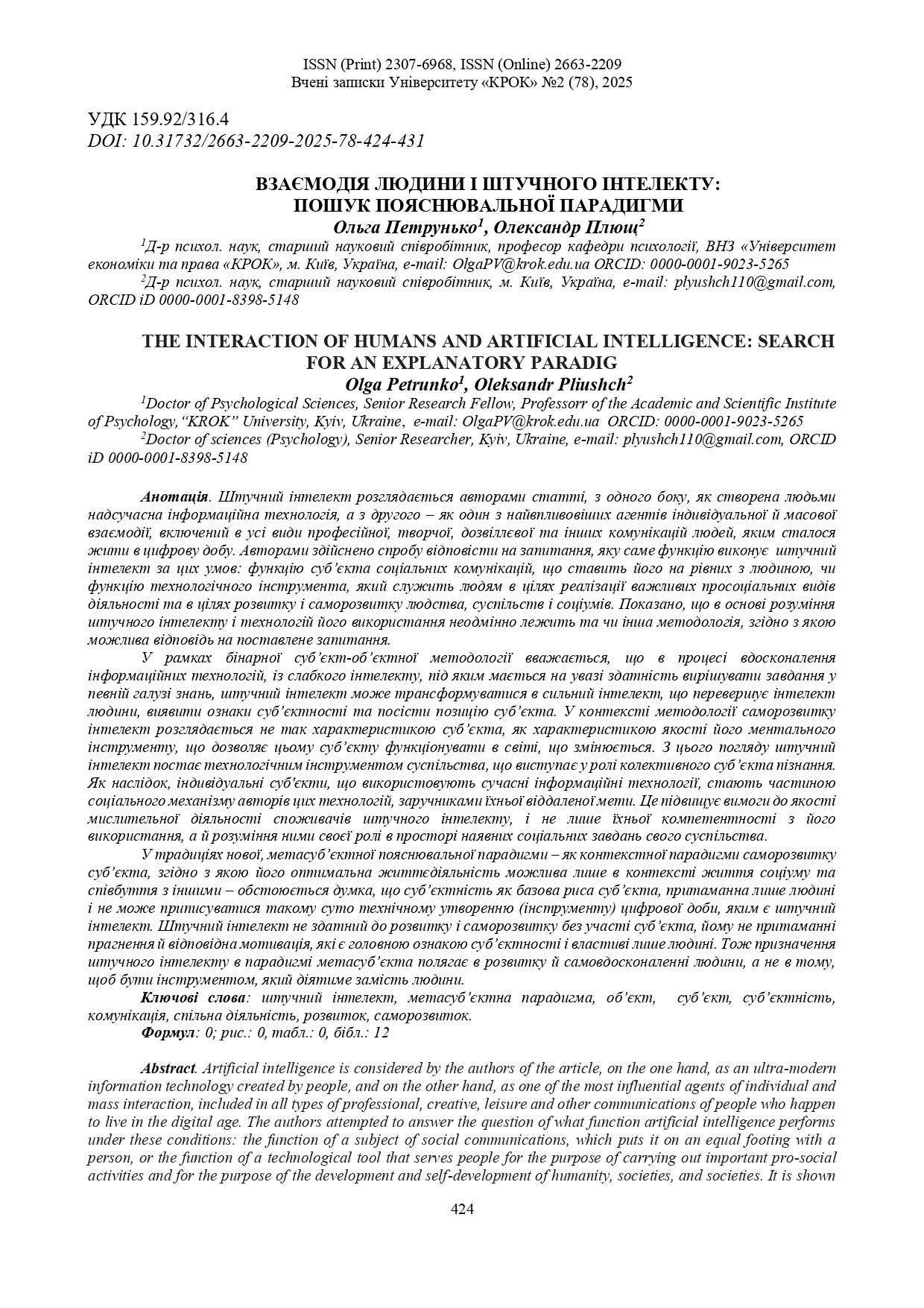THE INTERACTION OF HUMANS AND ARTIFICIAL INTELLIGENCE: SEARCH FOR AN EXPLANATORY PARADIG
DOI:
https://doi.org/10.31732/2663-2209-2025-78-424-431Keywords:
artificial intelligence, metasubject paradigm, object, subject, subjectivity, communication, joint activity, development, self-developmentAbstract
Artificial intelligence is considered by the authors of the article, on the one hand, as an ultra-modern information technology created by people, and on the other hand, as one of the most influential agents of individual and mass interaction, included in all types of professional, creative, leisure and other communications of people who happen to live in the digital age. The authors attempted to answer the question of what function artificial intelligence performs under these conditions: the function of a subject of social communications, which puts it on an equal footing with a person, or the function of a technological tool that serves people for the purpose of carrying out important pro-social activities and for the purpose of the development and self-development of humanity, societies, and societies. It is shown that the basis of understanding artificial intelligence and the technologies for its use is necessarily a particular methodology, according to which an answer to the question posed is possible.
Within the framework of the binary subject-object methodology, it is believed that in the process of improving information technologies, artificial intelligence can transform from weak intelligence, which refers to the ability to solve problems in a certain field of knowledge, into strong intelligence that surpasses human intelligence, reveal signs of subjectivity, and take the position of a subject. In the context of self-development methodology, intelligence is considered not so much a characteristic of the subject as a characteristic of the quality of its mental tool, which allows this subject to function in a changing world. From this point of view, artificial intelligence appears as a technological tool of society, acting as a collective subject of knowledge. As a result, individual subjects using modern information technologies become part of the social mechanism of the authors of these technologies, hostages to their distant goal. This increases the requirements for the quality of the thinking activity of artificial intelligence consumers, and not only their competence in its use, but also their understanding of their role in the space of existing social tasks of their society.
In the traditions of the new, metasubjective explanatory paradigm – as a contextual paradigm of the self-development of the subject, according to which his optimal life activity is possible only in the context of the life of society and coexistence with others – the idea is upheld that subjectivity as a basic feature of the subject is inherent only to humans and cannot be attributed to such a purely technical formation of the digital age as artificial intelligence. Artificial intelligence is not capable of development and self-development without the participation of the subject, it does not possess aspirations and corresponding motivation, which are the main feature of subjectivity and are inherent only to humans. Therefore, the purpose of artificial intelligence in the metasubject paradigm is to develop and self-improve a person, and not to be a tool that will act instead of a person.
Downloads
References
Інформаційний вплив: теорія і практика прогнозування. (2011). К.: Міленіум. 240 с.
Петрунько, О. В. (2010). Інформаційне суспільство: проблеми медіасоціалізації. Соціально-психологічні чинники взаємодії суспільства та освіти. К.: Інтерпрес ЛТД, 2010. 367–378.
Петрунько, О. В. (2011). Медіа як психотехнологія формування національно-культурної ідентичності. Психологічні перспективи. Спеціальний випуск. К.: Міленіум. 148–154.
Петрунько, О. В. (2024). Теорія і методологія сучасної науки. Вчені записки Університету «КРОК», 1(73), 203–213.
Плющ, О. (2023). Методологія пізнання у постінформаційних суспільствах. Вчені записки Університету «КРОК», 1(69), 188–196.
Bostrom, N. (2014). Superintelligence: Paths, Dangers, Strategies. Oxford: Oxford University Press. 352.
Chalmers, D. (1996). The Conscious Mind: In Search of a Fundamental Theory. Oxford University Press. 432.
Clark, A., Chalmers, D. (2010). The Extended Mind. Ed. by R. Menary. Cambridge: MIT Press, 2010. 27–42.
Pliushch, A. (2025). Cognition in the context of self-development methodology. Philosophy of Science and Technology, 30(1), 82-96.
Le Cun, Yann & Brizard, Caroline (2019). Quand la machine apprend: la révolution des neurones artificiels et de l’apprentissage profonde. Edité par Jacob, Paris. 400.
Marcus, G. & Davis, E. (2019). Rebooting AI: Building Artificial Intelligence We Can Trust. Pantheon Books, New York. 247.
Spitzer, M. (2012). Digitale Demenz. Wie wir uns und unsere Kinder um den Verstand bringen. Droemer Knaur, München. 367.

Downloads
Published
How to Cite
Issue
Section
License

This work is licensed under a Creative Commons Attribution-NonCommercial 4.0 International License.

